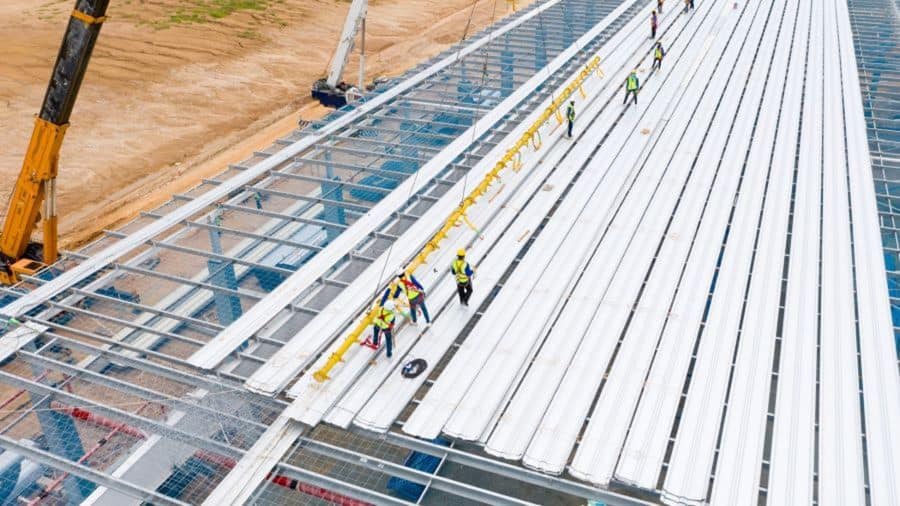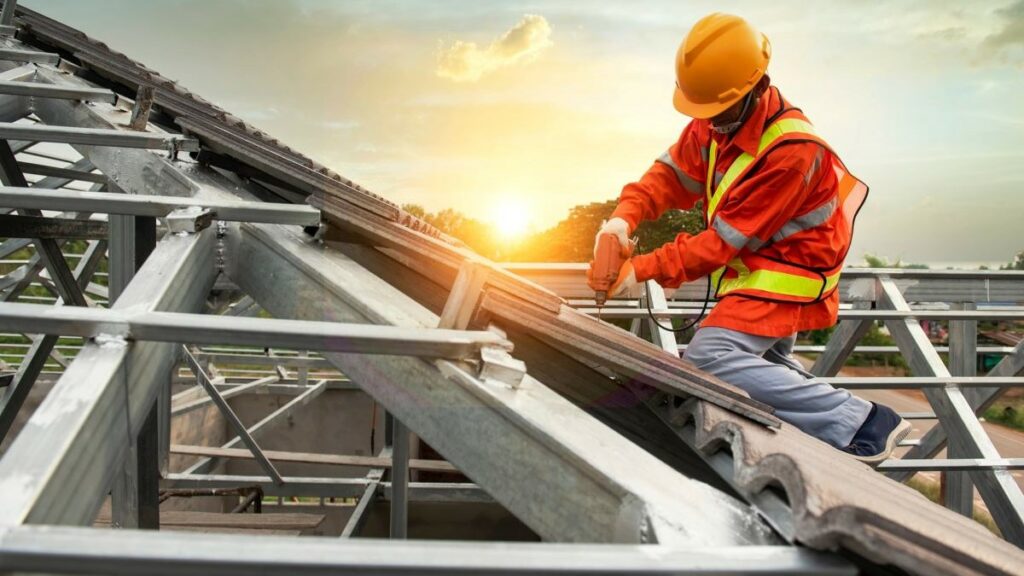Selecting the right commercial roofing contractor is a pivotal decision for any business. Your roof not only protects your property but also represents a significant financial investment. Therefore, it’s crucial to make an informed choice.
If you’re unsure about your choices, here are some key factors to consider. Taking these elements into account will help you find a contractor who meets your needs and ensures the longevity of your roofing environment:
1. Experience and Expertise in a Commercial Roofing Contractor
Experience is a cornerstone in the commercial roofing industry. A contractor with a rich history in the field brings a wealth of knowledge and problem-solving skills. They’re likely to have tackled various roofing challenges, which means they can handle whatever your project throws their way. Consider the following aspects:
- Depth of Experience: Look for contractors similar to Prairie Roofing with extensive experience in commercial roofing. The complexities and scale of commercial projects differ significantly from residential roofing. A contractor seasoned in commercial projects will be more adept at managing large-scale operations and unforeseen complexities.
- Specialization: Each roofing system has nuances, from flat to green roofs. Find a contractor with expertise in the type of roof your project requires. Specialization in a particular type of roofing system indicates a higher level of skill and knowledge, ensuring your roof is installed and masterfully crafted.
Find a contractor with a robust portfolio of completed projects and check their proficiency in handling roofs like yours. Their track record should showcase various projects, reflecting their adaptability and breadth of skills.
2. Licensing and Insurance
Safety comes first, and a professional roofing contractor understands this. Make sure your chosen contractor has the necessary licenses and insurance. Licensing proves they meet industry standards, while insurance protects you from liability in case of accidents or property damage during the roofing project. It’s a layer of security for both you and the contractor.
3. Quality of Materials
The longevity and durability of any roof type heavily depend on the quality of materials used. High-quality materials might cost more upfront, but they pay off in the long run by reducing the need for frequent repairs and replacements.
Ask a potential commercial roofing contractor about the brands they use and why they prefer them. Research these materials to ensure they suit your specific climate and roofing needs.
RELATED ARTICLE: ADVANTAGES AND DISADVANTAGES OF DIFFERENT ROOFING TYPES
4. Customer Reviews and References for a Commercial Roofing Contractor
What others say about a contractor can be very revealing. So sift through online reviews and testimonials to gauge customer satisfaction. It’s also essential to look for patterns in feedback. Consistent positive remarks about professionalism or timeliness are a good sign, while repeated complaints may be a red flag. Here’s how to get the most out of this step:
- Analyze Overall Satisfaction: Look beyond the star ratings. Read reviews to understand specific aspects of the contractor’s service that customers appreciated or had issues with.
- Check Response to Negative Reviews: Notice how the contractor responds to negative feedback. A professional and solution-oriented response to criticism indicates a commitment to customer satisfaction.
- Contact Past Clients: Don’t hesitate to ask for references and actually follow up with them. Speaking to past clients gives you a firsthand account of their experience, helping you anticipate what to expect. Ask them about their overall experience, challenges, and how the contractor handled post-project support or warranty issues.
Evaluating customer reviews and references thoroughly will provide a clearer picture of the contractor’s reliability and quality of work, helping you make a more informed decision.
5. Warranty and Service Guarantees a Commercial Roofing Contractor Offers
A reliable roofing contractor will stand behind their work. So inquire about warranty options and what they cover. Also look for warranties encompassing materials and labor, offering comprehensive protection against potential defects and installation errors. A good warranty acts like a safety net, rectifying any issues without additional costs.
Moreover, check if the contractor offers service guarantees. This is not just about fixing problems. It’s a commitment to maintaining the quality of your roof over time. Contractors who provide service guarantees demonstrate a long-term dedication to client satisfaction as well as the enduring performance of their work.
6. Communication and Professionalism
Effective communication is critical to any successful project. Your commercial roofing contractor should be approachable and ready to answer your questions. They should also keep you informed throughout the project. Professionalism extends as well to their timeliness, respect for your property, and ability to adhere to the agreed timeline and budget.
7. Cost and Financing Options
While cost shouldn’t be the sole deciding factor, it’s undeniably essential. Therefore, seek detailed, written estimates from multiple contractors for comparison. Be wary of significantly lower quotes, which could indicate subpar work or hidden costs. Also, explore if the commercial roofing contractor offers financing options, which can help ease the financial burden of a large roofing project.

8. Safety Record
A contractor’s commitment to safety reflects their professionalism and operational standards. Therefore, inquire about their safety record and protocols. A commercial roofing contractor who prioritizes safety is more likely to execute your project without accidents or violations, ensuring a smoother process for everyone involved. Key aspects to consider include:
- Training and Certification: Ensure the contractor’s team is well-trained and has the necessary safety certifications. This indicates their proficiency in handling hazardous situations as well as their compliance with safety regulations.
- Safety Equipment and Procedures: Check if they utilize proper safety equipment and adhere to stringent safety procedures on-site. This minimizes risks and showcases their dedication to maintaining a secure working environment.
By scrutinizing these safety aspects, you gain insight into the contractor’s operational ethos and their commitment to the project’s success as well as the well-being of everyone involved.
9. Environmental Considerations
When selecting a commercial roofing contractor, consider their approach to eco-friendly practices. This includes using sustainable materials, employing energy-efficient installation methods, and implementing waste reduction strategies. A contractor who prioritizes environmental considerations demonstrates a commitment to protecting your property as well as the planet.
In addition, eco-friendly roofing can lead to energy savings and tax benefits, making it a wise choice both financially and ecologically. This proactive approach to sustainability can also enhance your company’s image as an environmentally responsible business, resonating with customers who value green initiatives.
RELATED ARTICLE: MAINTAINING YOUR COMMERCIAL BUILDING: 4 KEY AREAS
Conclusion
Carefully selecting a commercial roofing contractor is pivotal for your business. These key factors equip you to choose a partner who guarantees the quality, durability, and safety of your roof. Keep in mind that the right contractor plays a significant role in the longevity and success of this critical business asset.
RELATED ARTICLE: OVERVIEW OF TECHNOLOGIES FOR A SAFER INDUSTRIAL WORKPLACE
